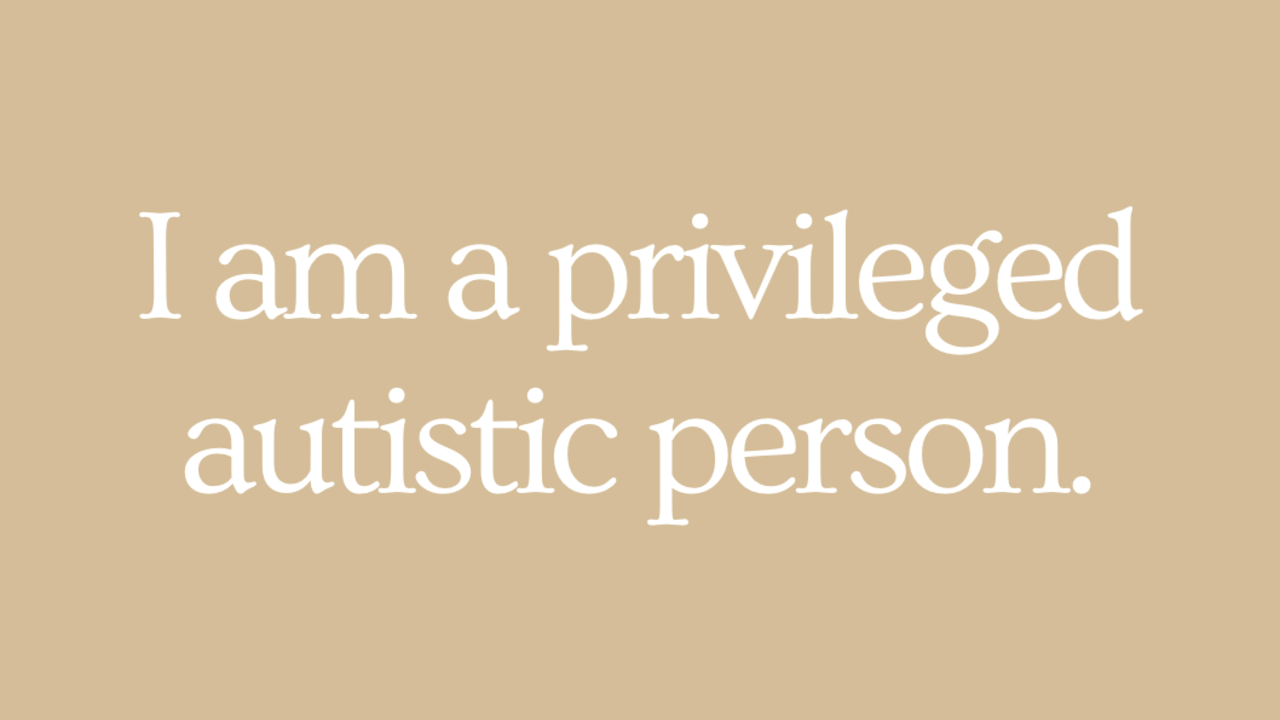I am a Privileged Autistic Person

I want to preface by saying I am afraid of making mistakes, afraid of my ignorance, but also well aware of my privilege in being able to say so. This writing is a reflection of my desperation to be an adequate ally and neurokin to my autistic siblings from other identities, cultures and intersectionalities of which I have no experience and/or do not relate to or share experience with as an autistic person.
If any of what I have written is offensive or triggering, please call me out.
~
When we understand autism as an identity and a culture, rather than primarily a medical disorder; we come to understand the serious nature of ethical discrepancies in non autistic professionals claiming the title or position of autism experts.
From the perspective of identity and culture, this is likened to a cis gender heterosexual professional claiming to be an expert on LGBTQIA+ culture and identity; or a Christian professional claiming to be a representative for the Muslim community.
Their understandings, their research, their 'expertise' only knows the bounds of their observations of autistic physical expression; that is - behaviour or how things appear on the outside.
The autistic community has experienced for over a century (and longer), being misunderstood, misrepresented, undermined and spoken over.
This has resulted in the 'criteria' only being reflective of a set of behaviours present in childhood, or in an autistic person who is not adequately supported, accommodated or understood.
The criteria is written and viewed through the lense of neuronormative functioning and completely dismisses all that it is to be autistic, outside of those categories.
To have your very existence summed up inside of an extremely limiting misrepresentation of forms of 'abnormality' is insulting, and limits the progression of being recognised of value, to say the least.
There are no experts on autism.
Because there are no experts on human.
And because, there is not one human experience, or one autistic experience.
Whilst it is true that an autistic person will have a greater understanding of the experience of being autistic, their expertise will only be reflective of their own lived experience and even then, we are always learning.
So how can any professional or self proclaimed non autistic ‘expert’ have the answers?
At the end of all that is pathologised,
Is one person and their personal experience of being autistic.
No case study, no paper, no medical test can summarise adequately the complete and concise experience of autistic being.
And what many of us so readily overlook is the inherently racist nature that compromises even my own understanding of autism; that the criteria is also built on being white and privileged.
I have no experience of being a person of colour and autistic.
I have no experience of being transgender and autistic.
I have no experience of being schizophrenic and autistic.
There are so many intersectionalities, and pockets of communities inside of the autistic experience and the autistic community; in much the same way that there are inside of the non autistic experience and the non autistic community.
We may speak for ourselves, but we have a moral and community related obligation and duty of care to be forever learning about and from our neurokin whose autistic experience differs from ours.
I want to encourage both non autistic and autistic people to understand this when reading and learning about autism:
I am a white, cis gender autistic person who has the privilege of being able to unmask, to meltdown, to speak openly, I am aware of my many freedoms.
I am also aware that we have so much to learn and so much to understand about minorities inside of minorities.
I get to be an autistic person who behaves in many ways aligned with my neurodivergence and I get to live.
Not every autistic person, not every autistic community has this privilege.
There are people who are killed, tazed, jailed, beaten for their autistic expression (and I know there is so much more but this is not my story or my experience; nor my identity or culture to speak of).
We need to educate ourselves around this to learn how to be better neurokin and allies to all autistic people and not just those we identify with or relate to.
Seek out autistic people in communities that differ to yours as part of your learning.
I also want to be clear that what I have written is limited by my experience and I do apologise if I am ignorant in any sense.
.
.
.
Kristy Forbes
inTune Pathways